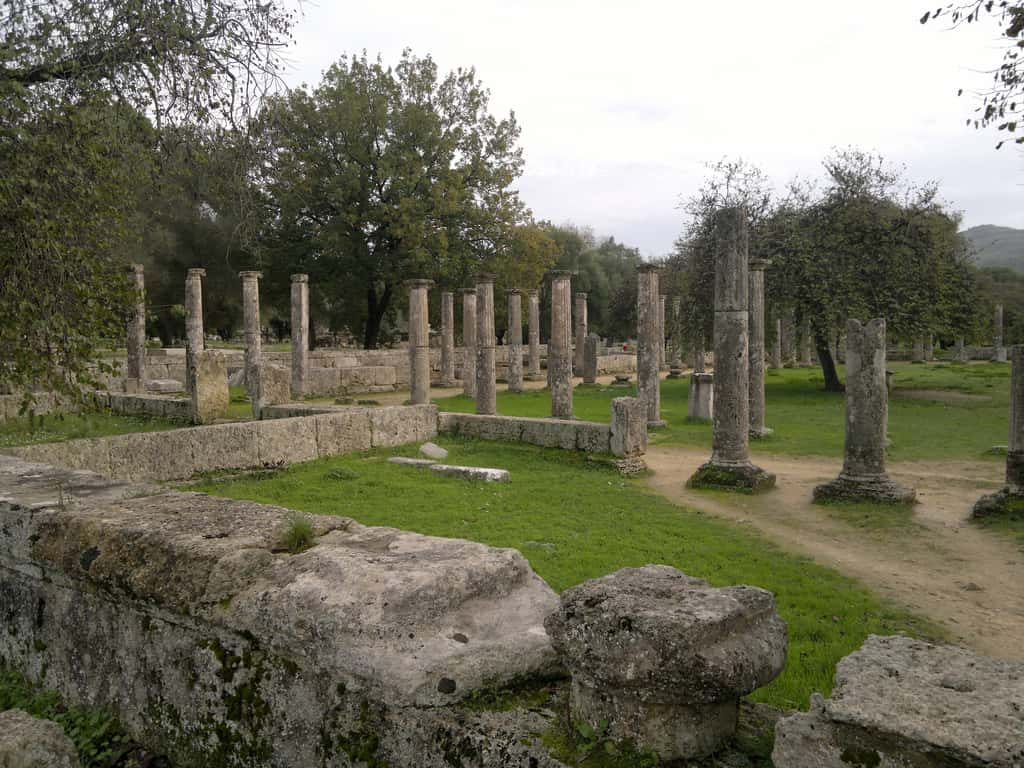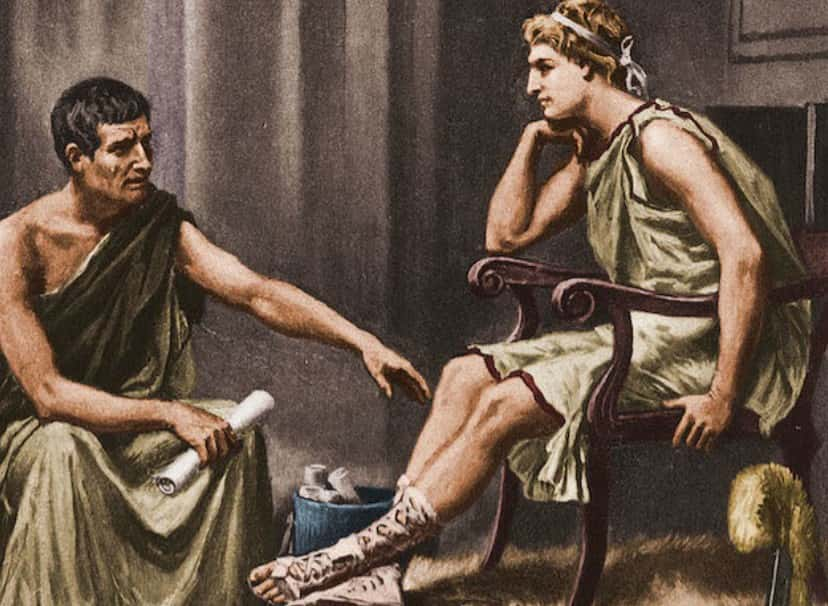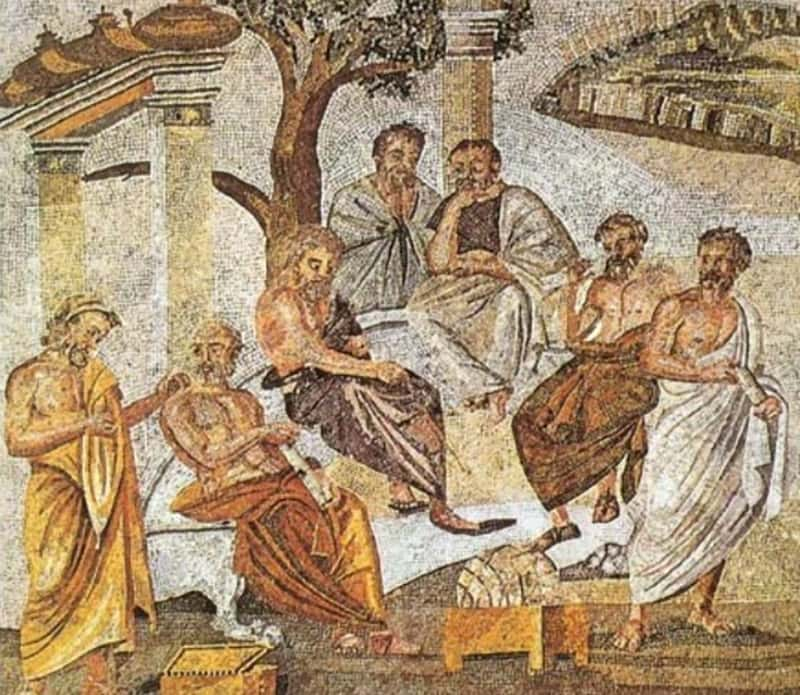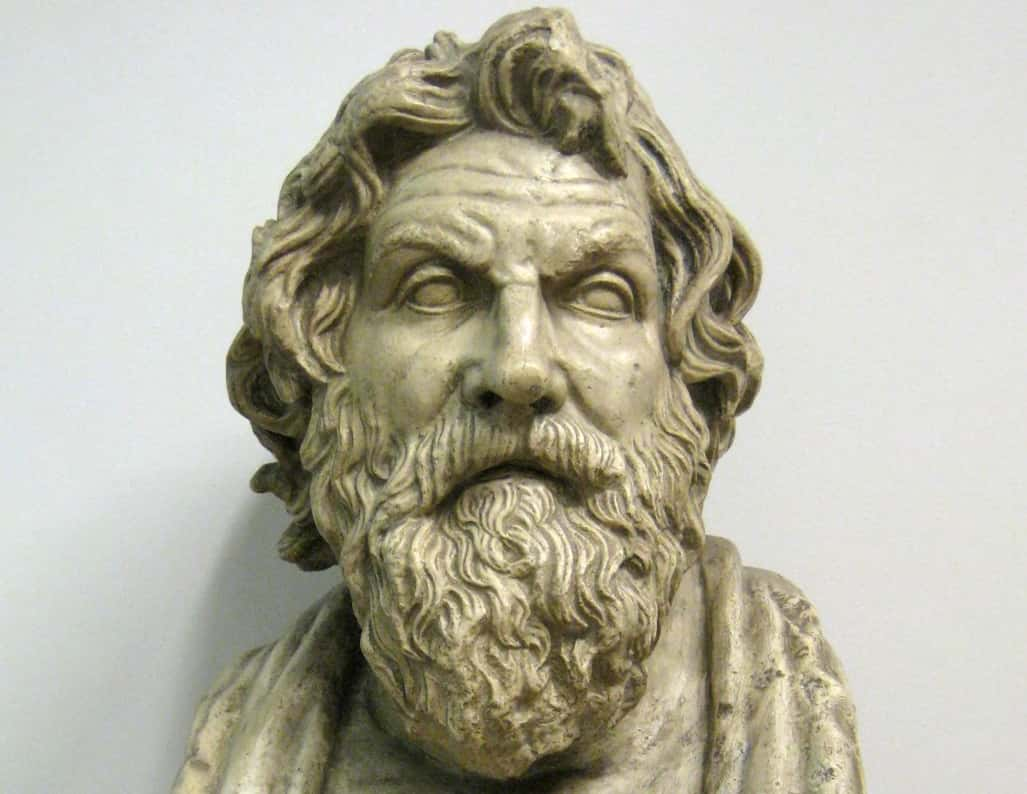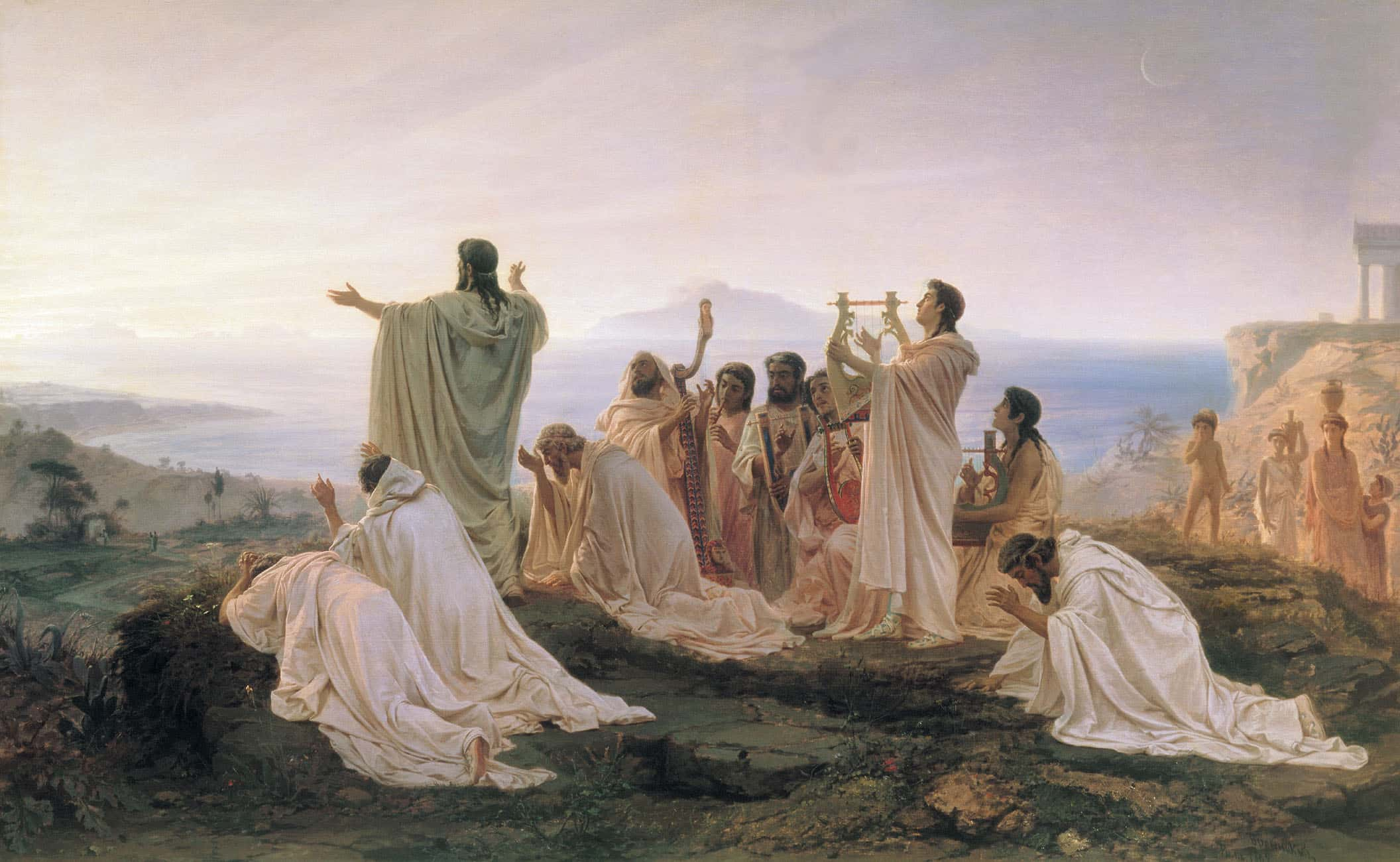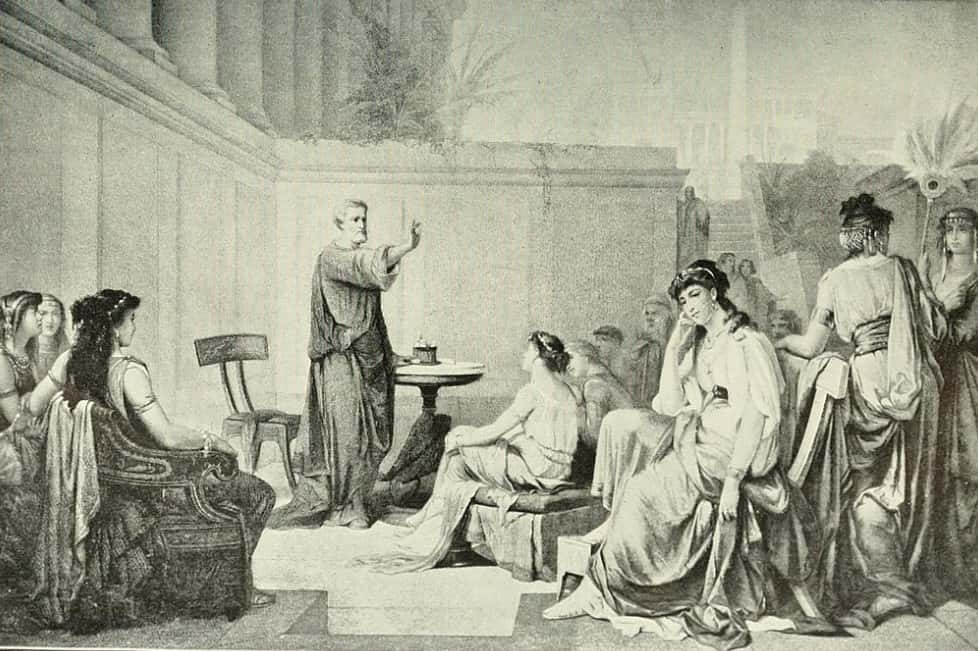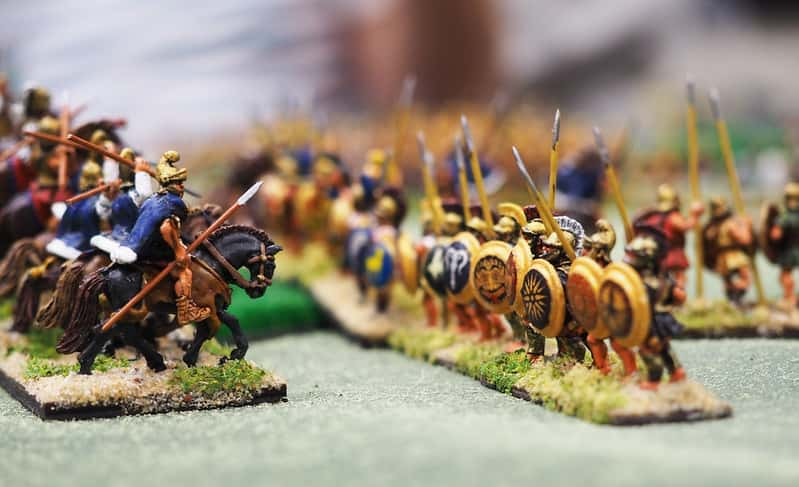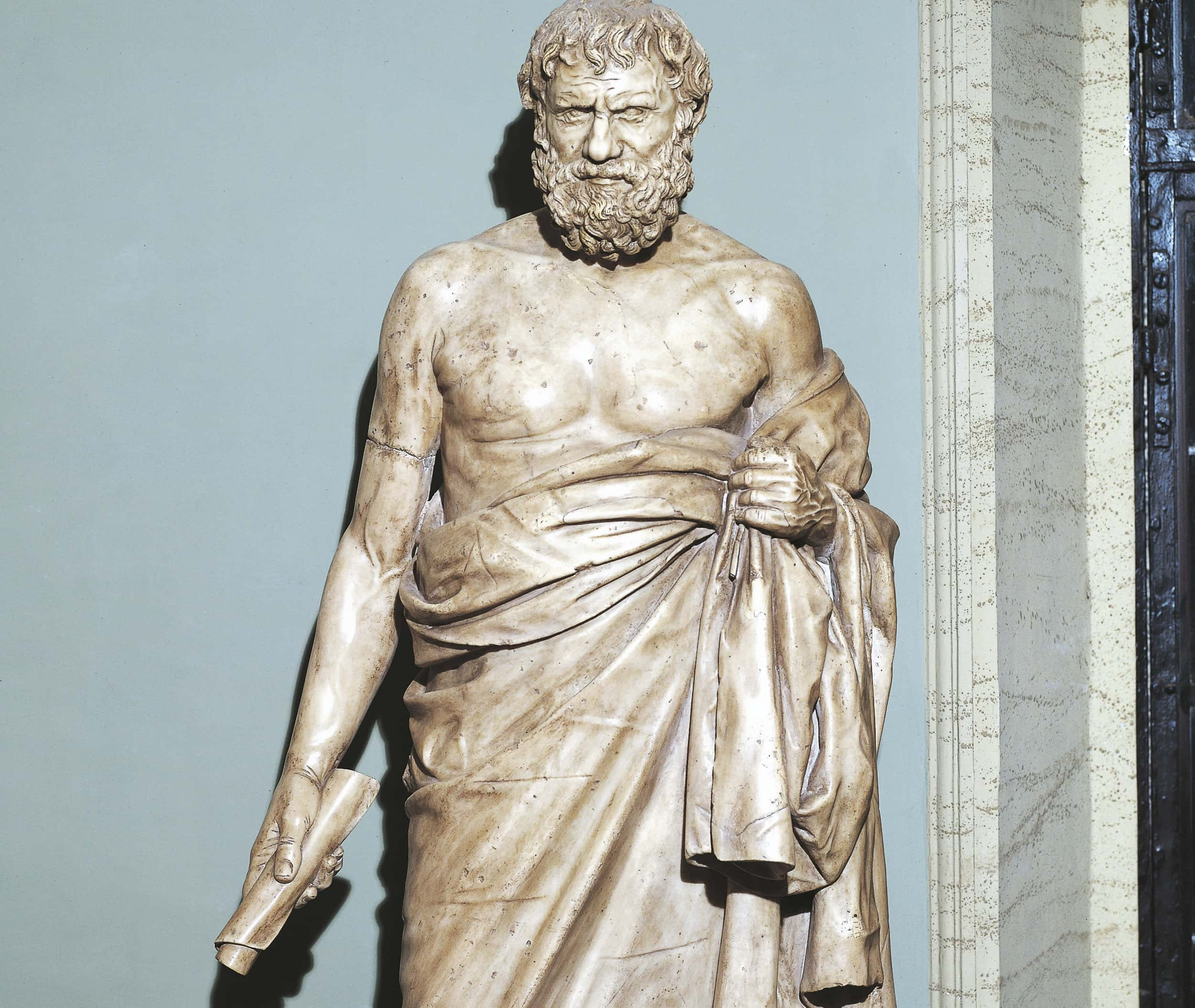“A philosopher once said, 'Half of good philosophy is good grammar.'”—A. P. Martinich.
To the best of our ability, let’s picture a “Greek philosopher.” Most will imagine an erudite man in robes, one who spends all day advising his students and state leaders in important matters, and the rest of his nights in thought and deep writing. These ideas formed the basis of much Western thought, and we’ll for sure cover them here. However, when put against the facts, what lacks in this image of the Greek philosopher?
For starters, where is the chicken-plucking? Or the public urination? When it comes to men of so many ancient ideas, not each one can be a gem. Don’t just settle for their ideas—learn about the weird lives of history’s great minds with these 42 shocking facts about Ancient Greek philosophers.
Ancient Greek Philosophers Facts
42. Featherless Friends
The ancient philosopher Diogenes once delivered Plato a plucked chicken and called it a “man.” You see, Plato had argued that man was nothing but “a featherless biped.” To show Plato what an assumption that was, Diogenes secured the live poultry pal and had it plucked. His bravado forced Plato to amend that definition of “man” to include “with broad flat nails.”
41. Alone Time Isn’t Fun Time For Everyone
We imagine it was hard to offend those Ancient Greeks, but the quirky Diogenes put that to the test by pleasuring himself while inside of a barrel. Frequently. And in public. Diogenes defended his behavior by saying how he wished it was “as easy to relieve hunger by rubbing an empty stomach,” as if that counts as a defense.
40. Wash Your Brain and Your Hands
Adding to the list of Diogenes’ social faux pas, the philosopher was also (allegedly) known for pooping in public theatres and urinating on “annoying” people. Well, it takes one to know one, Diogenes.
39. Where’s a Flyswatter When You Need It?
Socrates questioned the social norms of his people so much, he was known as “the gadfly of Athens.” Ouch.
38. You’re Welcome
We all know Socrates was famously sentenced to death for “corrupting the young” with his ideas. What’s less known is that when he was asked how he ought to be punished, he suggested “free maintenance by the state,” i.e. be given free food and wages because his constant questioning had done such a service to their society. Naturally, the government didn't exactly agree with his sentiment, and they instead gave him the hemlock.
37. School’s Out
We mostly hear about the philosophers who thrived and went on to write big books and found big academies. But what about the thinkers who failed? Greek philosopher Alexinus was so sure of his greatness, he moved from Elis to Olympia just because his idea for a school named the “Olympian” wouldn’t make sense without the locale change. Unfortunately, he was a bad administrator; the school ran out of supplies, leaving him with no students. I'm not sure that counts as a school anymore?
36. The Demonax Diet
Demonax as a Greek philosopher who was so chill, he gained a reputation for being an expert peace-maker for politicians, brothers, and couples. Eventually, he got so chill, he stopped eating; aged almost 100 years old, he could no longer take care of himself and starved to death.
35. Talk the Walk
Aristotle was literally a step ahead of his students; the philosopher loved to stroll while teaching at the Lyceum campus, so students were forced to walk behind him. As a result, the students were known as “Peripatetics,” derived from the word for “people who travel about.” Way to burn calories as you learn, guys.
34. High of Birth and Intelligence
Aristotle descended from the courtly aristocracy of Macedonia. His own father, Nicomachus, was the court doctor for King Amyntas II.

Sign up to our newsletter.
History’s most fascinating stories and darkest secrets, delivered to your inbox daily. Making distraction rewarding since 2017.
33. Star Pupil
“Big thinking” by itself can’t pay the bills; the great Aristotle also served as the tutor for the young son of Macedon's King Phillip II. This boy would grow up to be none other than Alexander the Great. Guess he was a pretty good teacher!
32. Behind the Laughter
In some retellings, Chrysippus died after a donkey ate his figs, which caused the philosopher to laugh so hard at his own joke (“Now give the ass a drink of pure wine to wash down the figs”) that he died.
31. Get Ready to Learn
What philosopher list would be complete without reference to Plato’s Academy? Founded in 385 BCE, the school would go down as one of the first institutions of higher learning in Western civilization. Plato led the Academy for the rest of his life and it would continue for centuries until 529 CE.
30. So Close, Yet So Far
In 560 BCE, the Greek philosopher Anaximander became one of the first people to realize the Earth could not be flat. But he didn’t get everything right: he thought that it was shaped like a cylinder. Baby steps...
 Flickr, Steven Zucker, Smarthistor
Flickr, Steven Zucker, Smarthistor
29. I Got Beef With Those Figures
One-hundred oxen were sacrificed to celebrate Ancient Greek mathematicians proving that the root of two is an irrational number.
28. Never Out of Print
The Greek philosopher Euclid is the most successful textbook writer of all time. In around 300 BCE, he wrote Elements, which has gone on to be republished in more than 1,000 editions since the advent of modern printing. Today’s publishers can only salivate at those figures.
27. Brains Over Beauty
Socrates was known for a lot of things, but it was not his sense of style. It’s said he always wore the same ratty old coat and didn’t even wear shoes. And it’s not like he was going minimalist to enhance his natural good looks; it’s also said Socrates was quite ugly.
26. The Sun Will Rise Again
When it comes to heliocentric models of the solar system, don’t let those pesky early-modern philosophers like Copernicus take all the credit. Aristarchus of Samos was the first Ancient Greek philosopher to suggest that the Earth revolved around the Sun, in about 290 BCE. Of course, practically no one took him seriously. We only know about him through the Archimedes, who held Aristarchus as ridiculous for his beliefs. Look who’s laughing now.
25. Brainy in the Buff
In one of the most famous stories in science history, Archimedes is said to have discovered how to measure the buoyancy of an object while butt naked. While the philosopher was settling down into a hot bath to ponder the problem, he noticed that the water rose as he became submerged. He realized that by measuring the displaced water, he could determine how buoyant he was. He was so excited by the revelation that he immediately jumped out of the tub and ran through the streets in his birthday suit crying "Eureka!", or "I have found it!"
24. Ladies Last
Hypatia was the most famous female scholar of this period of antiquity. A figure of both intelligence and eloquence, she was the last recorded member of the Library of Alexandria. But she was also a pagan, which triggered the rage of a Christian mob. Murdered in 415 AD, it’s said she was sliced to death by oyster shells (though the word used in ancient sources could also be translated as "roofing tiles," which is still pretty weird).
 Agora (2009), Mod Producciones
Agora (2009), Mod Producciones
23. The Uncuttable Democritus
Democritus is the first Greek philosopher to suggest that everything in our universe comes down to atoms. His reasoning? You can cut an object in half, over and over again, until each half is tinier than even a grain until eventually, you reach something that cannot be cut in half. These stubborn fractions of our universe would be knowns as “atoms,” so named after the Greek word for “atomos” for “uncuttable.”
22. Taking a Swim
Before we tossed words like “migration” to refer to birds in the wintertime, Aristotle taught that swallows spent the winter months in the bottom of rivers. Presumably, they rested in large heaps, waiting for spring.
21. When Life Gives You Philosophy, Make Olive Oil
If Thales of Miletus hadn’t been born in Ancient Greece, he could have worked for the futures market: the philosopher applied his vast knowledge to predict when olive harvests would be at their best. He then acquired all the olive presses well in advance to squeeze extra profit when demand peaked among the masses. However, he didn’t do so to get rich—he did this to prove that philosophical reasoning did have “real world” application. In other words, philosophers defending the “practical” existence of their field is nothing new.
20. Are My Ideas Too Hot For You?
According to a highly disputable legend, the Greek philosopher Empedocles was worshipped as god for saving the people of Selinus from a water crisis. Of course, he bought too much into his own legend. To show off his divine supremacy, Empedocles jumped into a live volcano and never emerged. I wonder what happened to him...
19. Are Utilities Included?
Pythagoras took the “simple” life to another level. His philosophy of Pythagoreanism revolved around disciplined and frugal living. Denying himself any kind of luxury, he was content to live alone in a cave on Samos, where he could study in peace. Hey, good real estate is hard to find.
18. When I’m Dead, Just Throw Me In Throw Trash
Demonax had so much chill, he had no problem with the idea of being eaten by fish, birds, or dogs. During a winter voyage, when asked how he thought about the ship sinking and him becoming fish food, he just responded with “'I should be very unreasonable to mind giving them a meal, considering how many they have given me.” When asked about his burial, Demonax told them "Oh, do not trouble; scent will summon my undertakers,” aka just let dogs and birds come for him, because there was “no harm in making oneself useful in death to anything that lives.”
17. What’s Mine Is Yours
While Pythagoras was all about ascetism, he was also about sharing. The philosopher demanded that his followers also share all they had with each other, which gave his school a very “commune” type of feel. The Pythagorians followed the motto of “Koinà tà phílōn” for “All things in common among friends.”
16. Does This Theory Hold Water?
Before Darwin’s Theory of Evolution, there was Thales of Miletus with his “water theory”—the belief that all life in this world came from the sea. Most scandalously, Miletus believed that water had nothing to do with the gods or other spiritual forces, but it instead operated by its own reason and logic.
15. Girls Allowed
It’s not controversial to say that Ancient Greece was a bro-fest. That’s what made Pythagoras so (in)famous: he argued that women were equal to men and his Pythagorean school included female students.
14. To Serve and Educate
Socrates served as a hoplite soldier, fighting in the Peloponnesian War. He even saved the life of acclaimed general Alcibiades, who commended his bravery in the Symposium. Not bad for a nerd who couldn’t dress cool.
13. It’s Him or Nothing
Long before the popularity of Christianity, the Greek philosopher Xenophanes held theological beliefs that strongly echo in Christianity, such as the belief in one God who resembles His mortals in form. He thus argued against the popular Hesiodic Greek practice of anthropomorphizing their gods.
12. Ready, Aim, Do Nothing
Zeno of Elea believed all motion in the universe was but a mirage. To prove it, he put forth “Zeno’s paradoxes,” of which the most famous includes a thought experiment known as the Arrow paradox: if one inspects an arrow at any given moment in time, it would only appear to stand in the air. By his logic, this means movement is an illusion.
11. I’m On An All-Aristotle Diet
Aristotle’s fame has only risen with his death. In his life, he was known as “the man who knew everything.” After his life, Thomas Aquinas would refer to Aristotle as just “The Philosopher” because he was the only thinker that he needed.
10. Don’t Call Me Baby
Before Darwin, there was Anaximander, who believed humans beings must have evolved from some other animal. His reasoning? If the first humans were infants, we would have died because babies are so helpless. We must have come from some other species with babies tougher than us, right?
9. Family is Fleeting, Philosophy is Forever
It’s hard to find info on the personal lives of most Ancient Greek philosophers. But in the case of Aristotle, we at least know he was married to a woman named Pythias. We also know that when Pythias died, Aristotle fathered a son with a slave named Herpyllis. The son, named Nicomachus after Aristotle’s own father, was also a philosopher, but he probably died in war when he was still young. Aristotle’s only solid legacy, then, would be his ideas.
8. I Want To Wake Up Now
According to the 2nd-century Greek thinker Artemidorus, sex dreams could predict the future. Don’t laugh, there was a very specific logic to it. For instance, are you dreaming about sex with your son on a trip? Prepare for good news! Are you a woman who is dreaming about pleasuring another woman? Wake up to widowhood, girlfriend.
In fairness, that might seem absurd, but we're still working out the science of dreaming today.
7. Fair Enough
Aristotle believed only “fair-skinned” ladies could achieve a climax during sex.
6. Raw Deal
The profound (and unhygienic) life of Diogenes the Cynic came to an end thanks to undercooked seafood. Either ate a raw octopus and died of colic, or he tried to feed an octopus to some dogs, for which he was promptly bitten and bled to death.
5. Take My Breath Away
Not all accounts of Diogenes’s death are so dramatic and food-filled. According to one account, the philosopher died after holding his breath too long in an act of suicide. Now that's commitment!
4. The Philosopher Formally Known as Plato
Despite his prolific status in the annals of philosophical history, “Plato” might not even be the man's real name. Some historians put forth that “Plato” was merely a nickname, and that he was really called Aristocles. That doesn’t have the same ring to it, so we get the change. Even crazier, the word “Plato” actually translates to mean “broad,” and one source says that he was given the name by his wrestling coach because he had such a huge figure. In this case, calling him "Plato" was essentially the Ancient Greek version of calling Terry Bollea "Hulk Hogan."
3. Resume Lifehack
Sold into slavery by pirates, the philosopher Diogenes was ordered to detail his trade. His answer: he had no trade but governing men, and so he should be sent to a man who needed a master. His witty response impressed a Corinthian named Xeniades, who promptly hired Diogenes to tutor his sons.
2. What a Waste
The dung-filled death of Heraclitus goes to show that even philosophers can make mistakes. Unable to get rid of his dropsy (edema) by regular means, Heraclitus allegedly buried himself in manure to “absurd” the excess water of his body. In one account, the philosopher found himself trapped in the doody-pile, where he was promptly eaten by dogs.
1. Lend Me An Ear?
When he wasn’t arguing that motion is an illusion, Zeno of Elea worked to rebel against his ruler, Nearchus. The rebellion didn’t work, of course, and Zeno was promptly kidnapped and brutally beaten. But before his death, he did manage to lure Nearchus close for a whisper... before biting his captor’s ear off.
Sources: 1, 2, 3, 4, 5, 6, 7, 8, 9, 10, 11, 12, 13, 14, 15, 16, 17, 18, 19, 20






